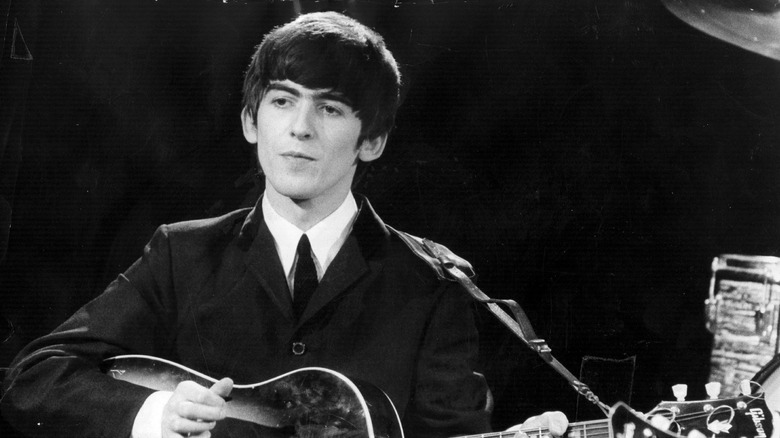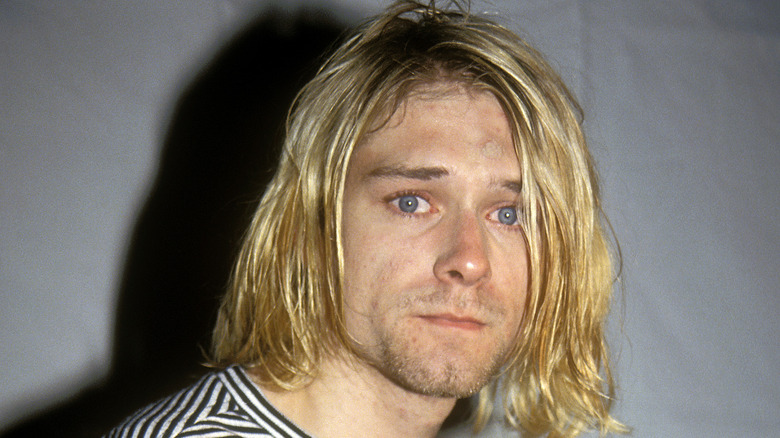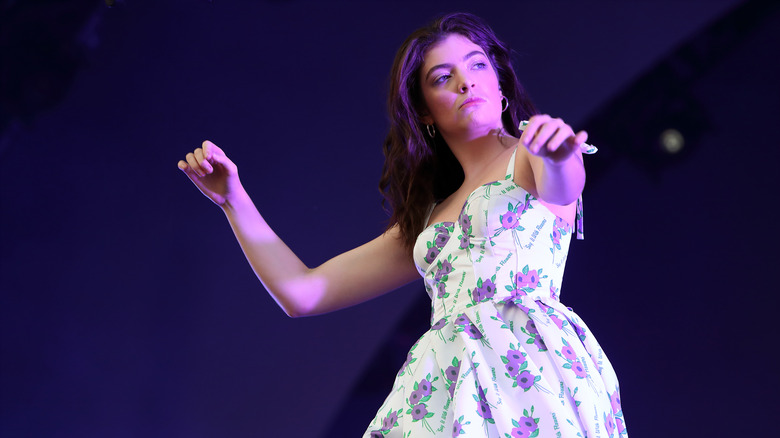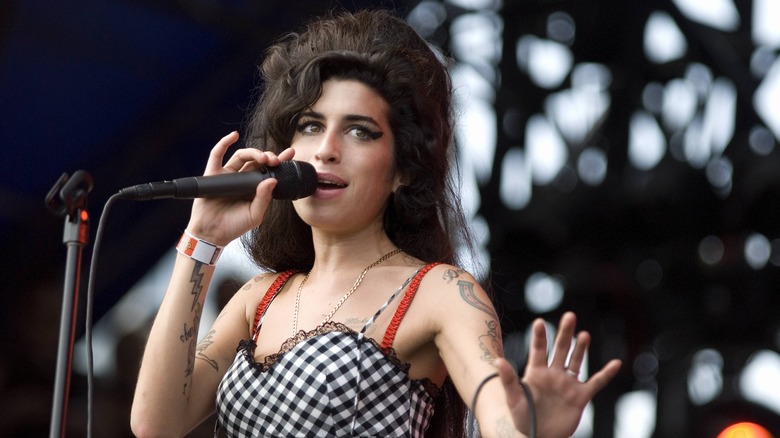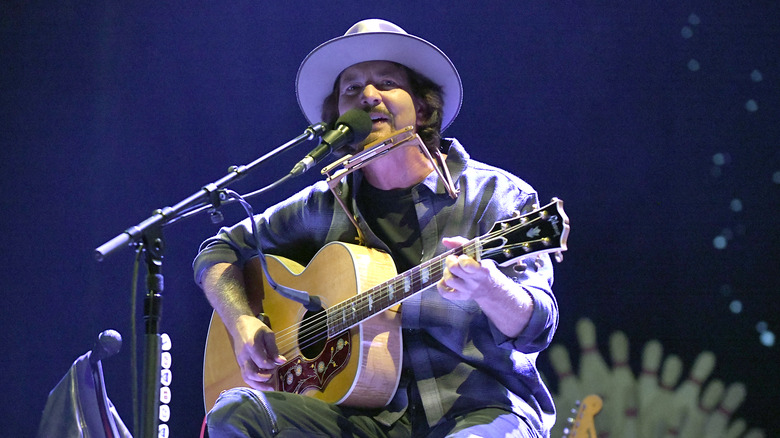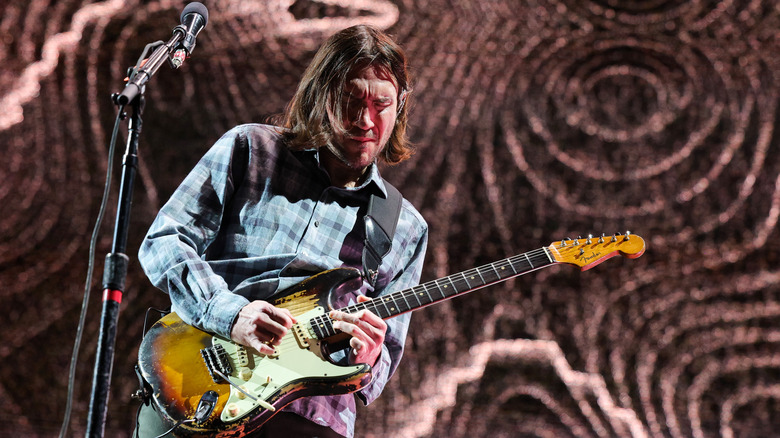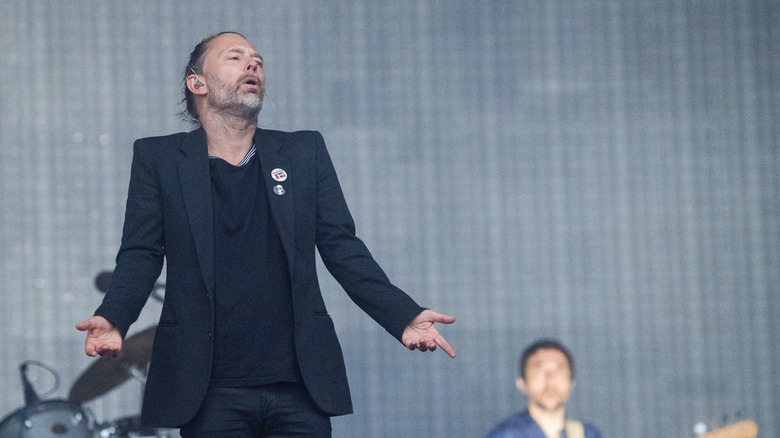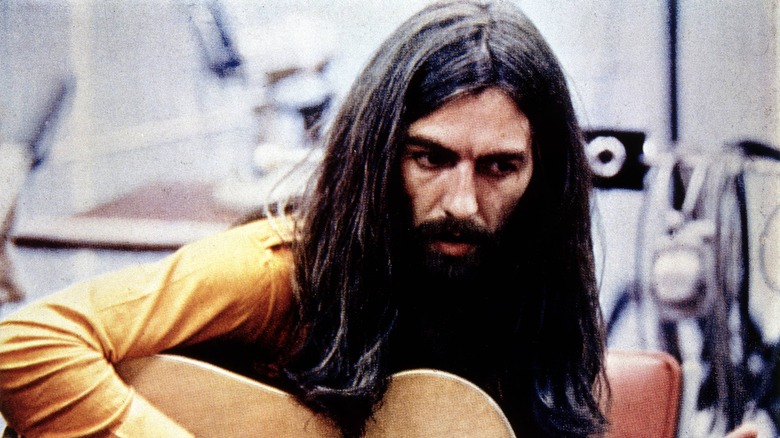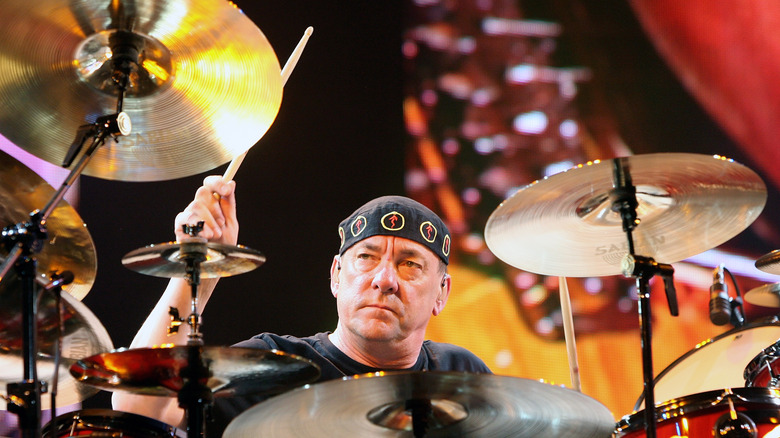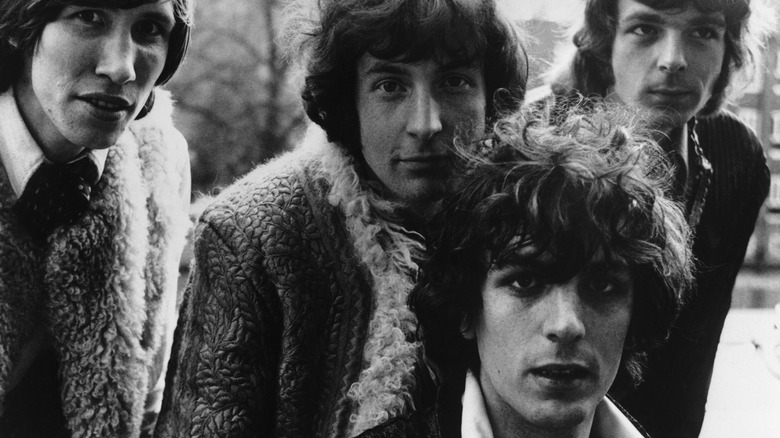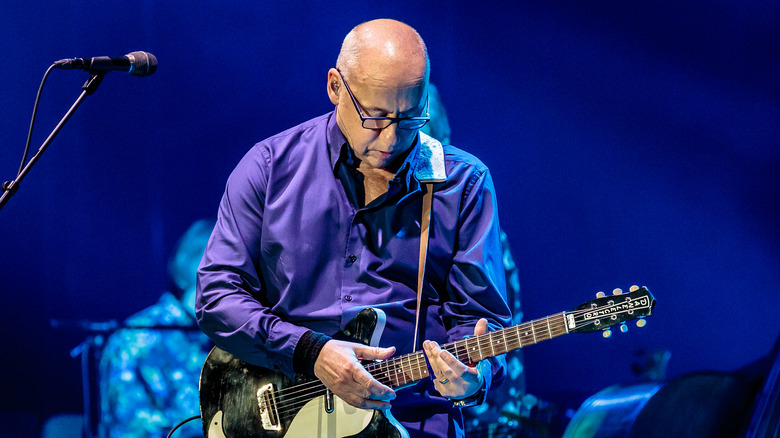Rock Stars Who Grew To Loathe Fame
Is fame a blessing or a curse? For these rock stars, it has most definitely been a curse for at least some of their career. Fame can bring praise and even worship, but it can also generate hatred and scorn on a scale that is hard for the human brain to handle. On the other hand, being held up as a hero is also not all that it's cracked up to be — it can bring its fair share of weirdos and stalkers, and it inevitably invites a massive loss of privacy. Even artists who actively chase fame sometimes discover they don't like the intense adulation once it arrives.
Artists like Kurt Cobain, Eddie Vedder, and Neil Peart all found themselves to be too introverted to play the fame game well. Other artists, like Amy Winehouse, resented having their dramatic personal lives splashed across the front page.
Finally, many musicians find that huge commercial success can jeopardize their artistic integrity. The deeply personal songs artists write are often misread by the public, leaving the writer feeling more misunderstood than ever. In time, the fame they achieved became something they loathed.
The following article includes allegations and accounts of addiction and mental health issues. If you or anyone you know needs help with these issues, help is available. Visit the Substance Abuse and Mental Health Services Administration website or contact SAMHSA's National Helpline at 1-800-662-HELP (4357). Alternatively, contact the Crisis Text Line by texting HOME to 741741, call the National Alliance on Mental Illness helpline at 1-800-950-NAMI (6264), or visit the National Institute of Mental Health website.
Kurt Cobain
Among fame-hating rock stars, Kurt Cobain is perhaps best known for his dislike of the limelight. Initially, however, Cobain did not shun publicity — according to Courtney Love in a National Geographic mini-series (via The Guardian), he actually chased it — at one point, he wrote to every major record label he could, in the hopes of becoming a rock god. Sadly the Nirvana frontman soon found himself trapped in a "careful what you wish for" type situation. According to Gillian Gaar's book "In Utero," his final album "In Utero" is filled with references to the dark side of fame, decrying the judgemental attitude of the media.
Despite their counter-culture ascetic and sound, Cobain quickly became a major celebrity icon and the subject of hero worship. Everett True writes in his book "Nirvana: The Biography," that after the release of "Nevermind," Cobain had his first taste of excessive attention at a record release party. Super shy Cobain was mobbed by fans, including kids from his old high school who demanded autographs. A famous photo from that day shows Cobain visibly freaked out and covering his face. The attention was just too much, and he was soon known for his hatred of the press.
Unfortunately, Cobain believed his dislike of celebrity only made matters worse. In one famous interview, he complained about being hassled in public, saying, "Well, I've been confronted by people wanting to beat me up, by people heckling me and being so drunk and obnoxious because they think I'm this pissy rock star bastard who can't come to grips with his fame."
Lorde
Kiwi singer Lorde reached superstardom at the tender age of just 16 years old. Although at the time many people remarked she was wise beyond her years, she was ultimately still just a kid, facing all the pressures of normal growing pains that teenagers go through. At the same time, she had to deal with the enormous weight of added public scrutiny.
When she first became famous, Lorde would go online and see cruel and unwarranted comments about her face and body. She told NME, "I remember being made aware of my looks and my body in a way that I had never been." Being famous started to feel like a burden. As the peak of Lorde-mania began to wane, she said she only felt relief.
Body-shaming trolls aside, she also just doesn't enjoy the fakery. She told CBS she was never comfortable with the PR that comes with being a celebrity and compared it to running for political office. She much prefers to be tucked away in a studio or a library. She said, "You don't win by being really famous — I don't think that really helps make good work."
Amy Winehouse
Amy Winehouse's catastrophic slide into self-destruction was chronicled in the media in painful detail. Press scrutiny caused her to loathe fame and may have worsened her fragile condition.
The extent of Winehouse's difficult relationship with the spotlight was revealed after her untimely death rocked fans. Shortly after she passed away, friends of Winehouse admitted on a BBC Radio 5 special that the singer never really desired fame and fortune in the first place — she had been more interested in starting a family and having kids (via Digital Spy). Winehouse was often trapped in her home in an attempt to avoid the press, who were intent on showcasing her darkest moments with relish. In an interview with This Morning, Winehouse's one-time best friend, Tyler James, alleged that Winehouse had once told him, "Fame is like terminal cancer, I wouldn't wish it on anyone."
Some speculate that Winehouse's alcohol addiction was probably made worse by the way she was picked apart in the papers. Even before her success, she faced numerous personal challenges, including bulimia and a long history of substance misuse. Ultimately, like many people, she was not really equipped to deal with the pressures of fame. She died of alcohol poisoning in 2011, aged just 27.
Eddie Vedder
Like fellow grunge legend Kurt Cobain, Pearl Jam's Eddie Vedder is well known for being deeply uncomfortable in the spotlight. According to Classic Rock magazine, way back in 1993, when the band had just released their second album, "Vs," Vedder was already apprehensive about their dizzying rise to fame. Feeling ill-at-ease with the pressure, Vedder and his bandmates withdrew as much as they could — he started refusing to do interviews and shrinking from publicity — despite the urgings of the groups' handlers, who encouraged them to keep milking the situation.
He told The New York Times, "As far as fame, when we were getting successful, it was like being on a freight train. You're in the engine room; there are no windows; you feel the velocity but don't know where the train is going ... We thought, 'We've got to slow down or change direction because there might be a bridge that's blown out and it'll all go away.'"
Many years later, in 2021, Vedder told Kerrang! magazine that he is still reluctant to speak to the press and may one day refuse to give interviews entirely. "I don't want to be a star," he said, adding, "It's not worth it, to have my picture taken and have my face everywhere."
John Frusciante
Guitarist John Frusciante first left the Red Hot Chili Peppers in 1992 after cracking under the pressure of the spotlight. Finding that the life of mindless hedonism he'd sunk into was no longer fulfilling, Frusciante stepped away. The rock and roll lifestyle had deeply damaged Frusciante, who began misusing drugs every day, and at one point was almost destroyed by his addiction and mental health issues.
Lead singer Anthony Kiedis, described Frusciante's retreat in unsympathetic terms. He claimed that the guitarist felt their stardom had compromised the group's artistry, and that playing for arenas full of kids was deeply uncool (via Anthony Kiedis' "Scar Tissue"). He wrote: "John was reading a lot of William Burroughs then, and his view, from Burroughs, was that every true artist is at war with the world." Frusciante longed for the days when the Chilis played small clubs with small audiences.
Although Frusciante would rejoin the band several times, he redirected a lot of his energy into his more lowkey solo career — sequestered away from the media circus that generated around the Chilis at the height of their fame. In an interview with Fact Mag, he explained, " ... I don't want to make a spectacle of myself as a guitarist in the way that I did when I was in the Red Hot Chili Peppers. I wanted to be inside the music, not standing outside of it to grab your attention."
Thom Yorke
Like many musicians, Radiohead's Thom Yorke wanted to be famous from a young age, only to find fame was ultimately not fulfilling. He once told Dazed magazine, "I always assumed that it [fame] was going to answer something — fill a gap. And it does the absolute opposite."
Aside from the unwanted publicity, Yorke struggled with the fact that he found his own biggest hit — "Creep" — extremely irritating to perform. Today the band rarely plays it at all, and Yorke has been criticized for repeatedly abusing fans that requested it.
Suddenly, Yorke found that he had no privacy, and people began to follow him around asking him questions, according to an interview with The New York Times. He did not like their familiarity and soon longed to escape. Finding his fame overwhelming, Yorke took solitary walks along the clifftops in the U.K. He moved to the rural Cornish coast to avoid the crowds and reconnect with his art.
George Harrison
Known as the "quiet Beatle" for shying away from interviews, George Harrison was ill-at-ease with the hysteria of Beatlemania. Although his legendary quietness was something of a myth — in private, he truly loved to gab with friends — he really did not enjoy hobnobbing with the public or courting the press. For Harrison, the Beatle's hippy era of self-discovery was not just a phase — he was a true soul-searcher, a lover of green things, and a serious meditator. The glamor of show business simply did not suit him, especially when the attention he received became extreme. According to The Guardian, on his 21st birthday alone, Harrison received 15,000 birthday cards from adoring fans.
Harrison's widow, Olivia Harrison, claimed that after taking LSD, the hippy Beatle completely lost interest in fame altogether, and became committed to spiritual exploration instead. On a more negative note, he also became paranoid about large crowds around the same time, fearful of assassination — a fear that seems prophetic given Lennon's imminent demise at the hands of a fan. Harrison himself was also nearly killed by a fan with schizophrenia during a break-in, in 1999.
The screaming of thousands of fans had made him intolerant of loud noises, and he longed to get away from it all. Ultimately, he found solace in his garden. Speaking to The Week, his son Dhani recalled, "I was pretty sure he was just a gardener ... Being a gardener and not hanging out with anyone and just being home, that was pretty rock 'n' roll, you know?"
Neil Peart
Rush drummer Neil Peart made his feelings about fame known with his classic hit "Limelight." His lyrics gave vent to his angry feelings about the suck-ups and kiss-asses that rock n' roll stars attract.
Unlike a lot of rock stars, Peart was never a showboating peacock— he was a soulful and private individual, who read widely and deeply, loved serious literature, and particularly enjoyed poetry. He rarely gave interviews and let the other members of the band hog the spotlight. Speaking to Hit Parader in 1994, he remarked, "I believe what Humphrey Bogart said, that the only thing you owe the public is a good performance." Peart believed his job was just to play music — nothing else. True to his word, he was known to be generous with his advice when it came to playing the drums, but he was reticent in all other ways.
Public figures, he opined, should not be held to a higher standard of morality, and he rejected the idea that rock stars like himself are obligated to be heroes off-stage. He complained, "I never wanted to be famous, I wanted to be good. I wanted to be a drummer, not a personality, not an entertainer. I've always had a total problem with fame; it's a destructive thing on both sides."
Gregg Alexander
Peddler of feel-good tunes, Gregg Alexander saw huge success with the New Radicals hit "You Get What You Give" in the 1990s. But Alexander had no desire for fame, and didn't relish it when it arrived. He quit the band in fairly short order, although since then he has penned many other successful songs for other famous musicians — including the likes of Ronan Keating.
Alexander became a largely anonymous figure, and spent a few years doing charity work instead. In fact, in 2014, when he agreed to speak to The Hollywood Reporter, it was the first interview he had given in 15 years. He explained that his hippie-ish persona was not just for show, and he deeply disliked the cottage industry that sprung up around the band when they hit the big time, saying, "You're this scrawny little f**king musician, some 28-year-old, but all of a sudden, you become the conduit to people's bonuses, their greater agendas ... There was a part of me that felt like it was going to f**king destroy me. I saw one chance to run out of the Hotel California ..."
Ultimately Alexander has left the industry three times, and has railed against what he calls the "corporatization" of music, referring to modern pop stars as mere "props for selfies." Only the love of songwriting has kept him coming back.
Syd Barrett
Among fame-loathing rock stars, Roger "Syd" Barrett is an unusual case; Barrett shrank from fame due to a serious mental illness, and may not have hated celebrity so much had he stayed well. Although Barrett was a founding member of "Pink Floyd" in 1965, he had already quit the group in 1968, partly due to his schizophrenia, per Britannica. Little is known about Barrett's later life — according to The Guardian, he gave a final interview in 1971, before vanishing for good. Barrett became notoriously reclusive, never speaking to his neighbors and having few visitors.
During the period when Barrett became unwell, he struggled to deal with a sudden rush of unwanted attention, a situation that exacerbated his creeping paranoia. Syd was attractive and extremely popular with women, so much so that groupies would show up at his house to see him (per Rob Chapman's "Syd Barrett: A very irregular Head"). Before long, however, he would not let people in when they came knocking.
Even before the group was particularly famous, Barrett did not enjoy the attention. He was shy around many people and would hide from those he didn't wish to speak to at parties. Barrett very successfully disappeared from public life, and is rumored to have taken up painting in private.
Mark Knopfler
Mark Knopfler, of Dire Straits fame, broke up his incredibly successful band when he felt the group had got too massive. Knopfler feared fame would go to his head, but he was also just known to be shy by nature; it has long been alleged that Knopfler wore his famous headband at his concerts so that he would not be recognized when he took it off. Knopfler once told Rolling Stone Magazine that although he loved success, he hated fame, a state of being that, he said, "... has no redeeming features at all" (via Classic Rock).
The Dire Straits were the biggest-selling British rock artists of the 1980s, but despite their runaway success Knopfler decided to break up the group in 1995. Knopfler's time in the band wreaked havoc on his neglected personal relationships, and caused a rift with his co-star and brother, David Knopfler, who left the group early and never spoke to Mark ever again. The group's last tour also proved to be too much — while on the road they played an astonishing 300 shows, and cracked under the pressure.
Knopfler told The Independent, "Once we got to the point of carrying our own stage, I felt the whole thing was just too big ... it's a trap that I just wanted to get out of. I needed to do something else, to try to improve as a writer and as a player. And I don't think being stuck in that kind of circus is where that's going to happen." Abandoning superstardom, he went on to pursue a quieter solo career instead.
